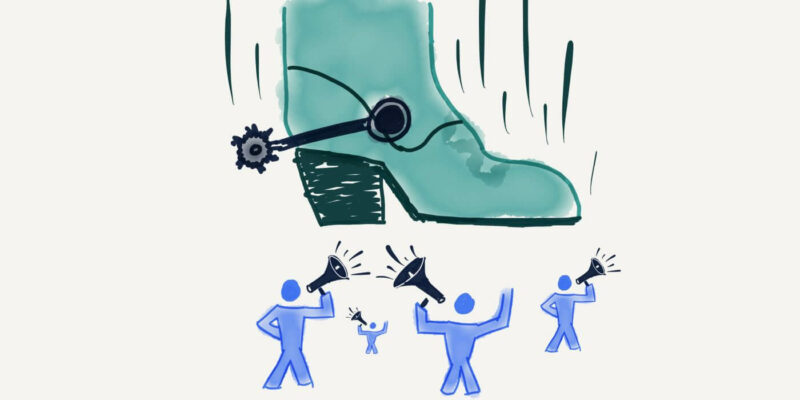Behind every painful emotion there’s a corresponding habit of overthinking: worry fuels anxiety, for example, just as envy generates jealousy.
But unlike the emotions they produce, overthinking is something you can control. You can’t make yourself feel less anxious, but you can choose to worry less, which will result in less anxiety.
Still, mental habits like overthinking are especially hard to break because they happen so quickly and they’re invisible. But with practice you can bring more awareness to these invisible habits. And when you do, you’ll have a much easier time letting them go.
To that end, here’s a short list of the five most common forms of overthinking I see in my work as a psychologist. Learn to spot these in your own thinking and you’ll be well on your way not only to feeling better, but very likely making better decisions and following through more consistently on your goals.
1. Worry
Worry is unproductive negative thinking about potential threats or dangers. It’s typically future-orientated and the object of the worries are often hypothetical in nature.
For example:
- She probably thinks I’m dumb… this date is going to be a disaster.
- What if I have a panic attack while I’m on stage?
- If they ask me a question about finance, I’m toast.
When you get in the habit of chronic worry—especially worrying about worrying or worrying about feeling anxious—you quickly fall into more severe forms of intense anxiety like panic attacks or performance anxiety.
The root cause of chronic worry is often a misguided attempt to feel more certain or in control. Which means worrying less comes down to increasing your tolerance for uncertainty and lack of control.
Learn More
Scheduled worry is a counterintuitive but highly-effective way to break the habit of chronic worry.
2. Self-Doubt
Self-doubt is unproductive negative thinking about your ability to perform a task or cope with a problem.
For example:
- I can’t handle getting anxious right now… I need to take something.
- I’m so indecisive… there’s no way I could make a decision that big.
- I’m out of my league in this group.
When you get in the habit of doubting yourself, it frequently leads to imposter syndrome, insecurity, and low self-esteem.
Often self-doubt serves the function of lowering expectations as a way to avoid disappointment or shame after a poor performance.
3. Rumination
Rumination is unproductive negative thinking about people’s faults and failings. It often takes the form of dwelling on our own mistakes or failures in the past (sometimes called depressive rumination), or complaining or venting about those of others (sometimes called angry rumination).
For example:
- How could he do that to me? It’s so unfair!
- She’s the worst! Did you hear about what she did during the off site last week?
- If only I had realized he was a narcissist before we went into business together…
Ruminating on our own mistakes and failures frequently is at the root of many forms of depression, inadequacy, and low self-esteem. We often maintain the habit because it gives the illusion of control.
On the other hand, chronic resentment and anger issues often stem from a habit of ruminating about others—whether out-loud or in our head. This habit typically sticks around because it’s an ego boost—pointing out other people’s flaws makes us briefly feel better or superior by contrast.
4. Self-criticism
Self-criticism is unproductive negative thinking about your own character or self-worth. It’s usually highly judgmental in nature and tone.
For example:
- Ugh… I’m such an idiot.
- This is so silly that I still feel sad after all this time.
- I’m a terrible mother.
While all forms of self-criticism are unproductive, there’s one sub-type called emotional self-criticism that’s especially harmful: when you get in the habit of judging yourself for how you feel, your brain learns to view your own emotions as threats, which means the intensity of your emotions will compound over time—feeling ashamed about feeling anxious, for example, will lead to chronic anxiety long-term.
Often self-criticism is driven by a core belief that conflates self-compassion with self-indulgence.
5. Envy
Envy is unproductive negative thinking about how you compare with others.
For example:
- Fantasizing about how much better your life would be if you had married your best friend’s wife instead of your own.
- Imagining how much more confident you’d feel if you had skin as good as that instagram influencer you follow.
- Rationalizing the purchase of a home outside your budget after visiting your best friend’s beautiful new home.
Chronic envy is often the most subtle form of overthinking because few people admit to themselves that they do it. But precisely because we’re so well defended against it, envy often leads to some of our most destructive choices and debilitating beliefs. And while most people associate envy with the emotion of jealousy, few realize that many forms of depression, self-esteem problems, and anxiety are also, at core, the result of chronic envy.
Next Steps
Simply being more aware of these types of overthinking is a powerful first step toward minimizing their negative effects.
But if you want to go deeper, here are some reflection questions to consider:
- Which form of overthinking is most problematic in your life and why?
- Every form of overthinking has a productive and healthy counterpart. Problem-solving, for example, is the productive counterpart of worry because it’s productive negative thinking about potential problems or threats. What are the productive counterparts of the other four forms of overthinking?
- Many forms of overthinking are driven by specific emotions. Rumination, for example, is often driven by the emotion of helplessness. For each type of overthinking you struggle with, ask yourself: What is the emotion that usually precedes my overthinking? Extra credit: What emotional need is my overthinking habit filling?
- Few of us overthink all the time. In fact, overthinking is often far more context-specific than we realize. For a given type of overthinking you struggle with, ask yourself: In what situations am I most (and least) likely to overthink?
- Who are your thinking models? Human beings are far more mimetic and imitative than we like to believe. We can harness this fact for good by surrounding ourselves with people who have healthy habits of mind and tend to think productively.
Learn More
If you enjoyed this essay, here are a few more from me that might be helpful:
- 7 Signs You’re an Anxious High-Achiever
- Cognitive Mediation: How Mind Makes Mood
- How to Stop Taking Things Personally
Work with Me
If you’re interested in working with me directly, I run a bi-annual emotional resilience masterclass called Mood Mastery. I also have a small private coaching practice for 1:1 work.




